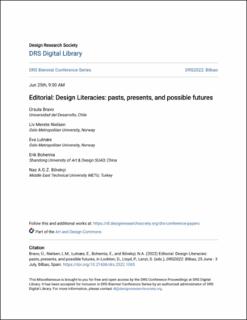Design Literacies: pasts, presents, and possible futures
Conference object
Published version
Permanent lenke
https://hdl.handle.net/11250/3054561Utgivelsesdato
2022Metadata
Vis full innførselSamlinger
Originalversjon
https://doi.org/10.21606/drs.2022.1065Sammendrag
Knowledge and skills are tightly entangled with economic and political powers. Critical studies (e.g. Crocker, 2017; Ritzer, 2018; Smart, 2010; Thorpe, 2012) exploring the relationships between design and consumerism suggest that skills, knowledge and ethics are inseparable from how these relationships are constituted. Thus, the design, production and consumption of artefacts, including services, are interconnected to values of the way we want or expect to live our and others' lives, the way resources are being exploited, and their subsequent effects on climate change. As values and expectations change, so do the relationships which make up these interconnections. For example, in the past agricultural societies, most of the population required skills such as animal husbandry to feed and sewing clothes to keep warm. The skills and values needed to operate in the current hyperactive global markets have shifted in other directions. To tackle the current issues, we propose that all people should be versed in design approaches to have a ‘say’ and the ability to meaningfully act on how today's artificial world is shaped.

